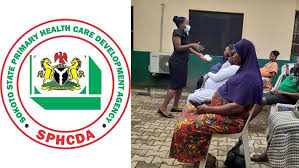Sokoto State is working on building a strong and people-focused healthcare system through careful planning, fixing old hospitals, and making targeted investments. This effort is being led by Governor Ahmad Aliyu.
The State Commissioner for Health, Dr. Faruk Umar Abubakar, said the state is carrying out a “complete and thoughtful reform” of a healthcare system that had been ignored for many years.
He explained that when the present government came into power, many hospitals were in very bad shape. Beds were broken, mattresses were torn, and medical equipment was old. He said the work being done now is not just small repairs but a total overhaul of the health sector.
Dr. Abubakar stated that the reforms are part of Governor Aliyu’s 9-Point SMART Agenda, which views health as a key to development. As part of this plan, ten general hospitals across the state are being renovated in stages. Many are getting new beds, incubators, solar power systems, and water from boreholes.
He added that important medical equipment, such as ultrasound scanners and X-ray machines, has been purchased and shared across the three senatorial zones. This is to stop the stress of patients having to travel to Sokoto city for basic tests.
“This government is bringing healthcare closer to the people. Now, people don’t need to go to Sokoto city just to get an ultrasound or an X-ray,” he said.
Besides fixing hospitals, the government has started a detailed needs assessment in all 23 local government areas. This will help them understand what is missing and create plans to improve healthcare at the primary, secondary, and tertiary levels.
Dr. Abubakar noted that Sokoto State has over 824 health centres, including primary health centres, small clinics, and at least one general hospital in each local government area. He also said two hospitals in Dange Shuni and Wamakko, which had been abandoned, are now being given special attention to finish their construction.
Looking into the future, he said the government plans to build a top-class referral hospital in Sokoto. This will help strengthen both preventive (to stop diseases before they happen) and curative (to treat existing diseases) healthcare services.
“We are changing from a system that waits for problems to happen before acting, to one that plans based on real data. That is the big difference we are making,” he said.
While there are still problems to fix, the commissioner said the state’s focus on careful planning and using data is setting the stage for lasting improvements. The aim is to move away from handling emergencies all the time to managing healthcare in a smart and organized way.


